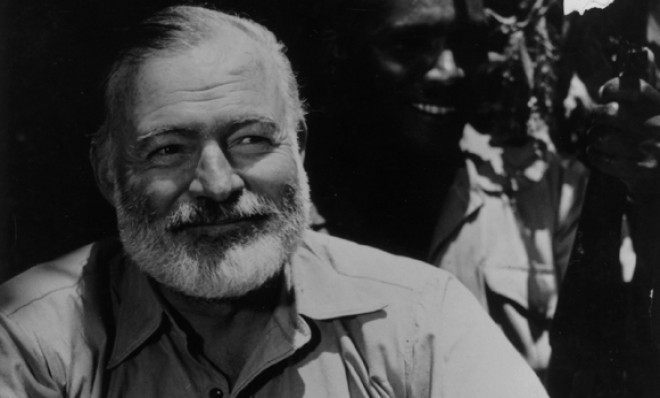11 historical figures who were really bad at spelling
Even Nobel Prize winners and celebrated authors have trouble getting words right

A free daily email with the biggest news stories of the day – and the best features from TheWeek.com
You are now subscribed
Your newsletter sign-up was successful

Do you struggle with spelling bees? Do you always seem to get "lose" and "loose" mixed up? Would you recoil in terror if spell-check ever stopped working? Fear not: You're in good company. From Nobel Prize winners to the authors of great literary works, the inability to spell correctly has plagued some of the most influential people in the history of our species. Here are 11 of the most famous.
1. Jane Austen
Luckily, the author of Emma and Pride and Prejudice was always fortunate enough to find editors who could weed out her various alphabetical mishaps. An early work, written when Austen was 15, was called Love and Freindship.
The Week
Escape your echo chamber. Get the facts behind the news, plus analysis from multiple perspectives.

Sign up for The Week's Free Newsletters
From our morning news briefing to a weekly Good News Newsletter, get the best of The Week delivered directly to your inbox.
From our morning news briefing to a weekly Good News Newsletter, get the best of The Week delivered directly to your inbox.
2. George Washington
According to Richard Lederer in his book More Anguished English, the man who would become the first American president wrote "we find our necessaties are not such as to require an immediate transportation during the harvist" while complaining about a supply shortage during the Revolutionary War.
3. Winston Churchill
Though he later became universally regarded as one of the greatest orators of all time, one of Churchill's early report cards said "Writing is good, but terribly slow — spelling about as bad as it well can be."
A free daily email with the biggest news stories of the day – and the best features from TheWeek.com
4. Agatha Christie
"Writing and spelling were always terribly difficult for me... [I was] an extraordinarily bad speller and have remained so until this day." It's incredible to think that this humbling statement came from the pen of one of the greatest mystery authors of all time: A woman who would later be celebrated as "The Queen of Crime." Christie's dyslexia made accurate spelling difficult, and she'd occasionally even misspell the names of her own characters: in An Appointment with Death, Colonel Carbury's name is later written as "Colonel Carbery."
5. Andrew Jackson
Examples of Old Hickory's seemingly innumerable botched spelling attempts include "devilopment," the continent of "Urope," and performing before a "larg" audience. This ineptitude even went on to become a political punchline. His perennial political rival John Quincy Adams once denounced him as "a savage who can scarcely spell his own name." Jackson's retort? "It's a damn poor mind that can think of only one way to spell a word."
6. Albert Einstein
In Einstein's defense, English was his second language. It's therefore easy to understand why spelling and grammatical errors in his works were a constant source of frustration to the physicist. "I cannot write in English," he said, "because of the treacherous spelling."
7. Ernest Hemingway
Hemingway seemed to have difficulty with present participles, as "loving" became "loveing" and "moving" turned into "moveing" in his manuscripts. Whenever an editor complained of these bloopers, however, Hemingway would snap "Well, that's what you're hired to correct!"
8. F. Scott Fitzgerald
The original draft of The Great Gatsby contained literally hundreds of spelling mistakes, some of which are still confounding editors. These include "yatch" (instead of "yacht") and "apon" (instead of "upon"). One of his most famous gaffes, which occurs toward the end of the novel, inspires debate to this day.
9. Olivia Clemens
Samuel Clemens — better known by his pen name "Mark Twain" — delighted in his wife "Livy's" frequent compositional errors. After receiving one of her letters, in which she miraculously made virtually no such bloopers, he wrote, "Oh you darling little speller! — you spelled 'terrible' right, this time. And I won't have it — it is un-Livy-ish. Spell it wrong next time, for I love everything that is like Livy." Despite Samuel's playful jabs, he relied upon his beloved wife as a "faithful, judicious, and painstaking editor" until her death in 1904.
10. William Butler Yeats
According to biographer David A. Ross, "Yeats' spelling, indeed, seems at times a matter of wildly errant guesswork." Ouch. The great Irish poet and senator's idiosyncratic writing style resulted in some distinctively misspelled words cropping up throughout his works, such as "feal" instead of "feel." Despite this Achilles' heel, Yeats won the Nobel Prize for Literature in 1923.
11. Dan Quayle
No list of famously bad spellers would be complete without mentioning the 44th Vice President's infamous "Potatoe Incident."
More from Mental Floss...
-
 How the FCC’s ‘equal time’ rule works
How the FCC’s ‘equal time’ rule worksIn the Spotlight The law is at the heart of the Colbert-CBS conflict
-
 What is the endgame in the DHS shutdown?
What is the endgame in the DHS shutdown?Today’s Big Question Democrats want to rein in ICE’s immigration crackdown
-
 ‘Poor time management isn’t just an inconvenience’
‘Poor time management isn’t just an inconvenience’Instant Opinion Opinion, comment and editorials of the day